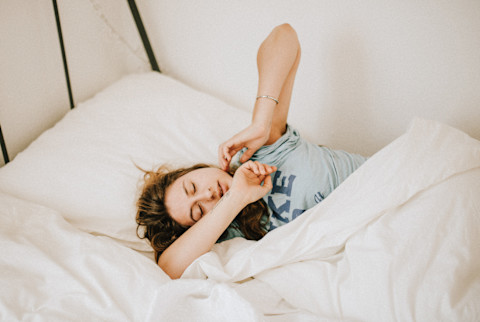For Stellar Sleep, Your Nighttime Routine Should Actually Start In The Morning

We know what you're thinking: Shouldn't a nighttime routine begin, ahem, at night? A valid question, but let's not forget that good sleep hygiene takes consistent effort—which means it can totally extend beyond the evening hours. If you're trying to maximize high-quality sleep, you need to incorporate healthy sleep-promoting behaviors all day long, period and full stop.
Take it from mbg's director of scientific affairs Ashley Jordan Ferira, Ph.D., RDN: "I actually like to think of nighttime starting in the morning," she says on the mindbodygreen podcast. (No, that doesn't include naps.) Ferira explains her morning-slash-nighttime routine below.
The benefits of thinking about bedtime in the morning.
Of course, Ferira has a solid wind-down routine as well (she typically watches relaxing TV shows, indulges in a mini facial massage during her beauty routine, and oftentimes pregames her sleep with a supplement clinically shown to have a calming effect on the brain*). But remember, your circadian rhythm follows a 24-hour cycle—so it's just as important to keep it in sync during the day, too.
Specifically, Ferira recommends getting some natural light exposure first thing in the morning, as the sun's blue light regulates your natural sleep and wake cycle1. ""I get up, get the largest glass of water, and I look outside," she says (her view in Charleston includes dolphins in the water—swoon). "I'm honoring my sleep that's going to come later in the day by that initial light exposure."
She also sticks to a morning shower to help any lingering grogginess subside. "I'm not an early riser, so showering is critical for wake-up," she says. For an initial shock to the system, try rinsing with cool water: Research shows that cool morning showers can boost productivity2 throughout the day. Just remember to rinse before bed, too, as an evening cleanse is crucial for washing off daily grime.
Finally, Ferira prioritizes physical activity during the day (evening works best for her chronotype and schedule), which we know is an important habit for improving sleep. One randomized controlled trial even found that engaging in regular moderate aerobic exercise, like walking or riding a bike, improved sleep quality and reduced the time it took to fall asleep3. Although, you might not want to exercise too close to bedtime (these are morning tips, remember?), as you don't want to get too riled up before tucking into bed.
As the sun sets, that's when she specifically focuses on winding down—keeping her blue light exposure to a minimum, setting her bedroom temperature to 68 degrees, grabbing her earplugs, and turning on her noise machine. (And if you're looking for an extra nudge for restorative slumber, she recommends capping off the night with mbg's bestselling sleep support+.*) A nighttime routine bound to set you up for stellar sleep, we'd say.
The takeaway.
Your circadian rhythm follows a 24-hour cycle. So to improve your sleep, it's important to support your sleep and wake patterns, not just one side of the coin. A few morning habits can help keep your body's clock in sync, which, according to Ferira, can tee you up for amazing sleep later in the evening.


